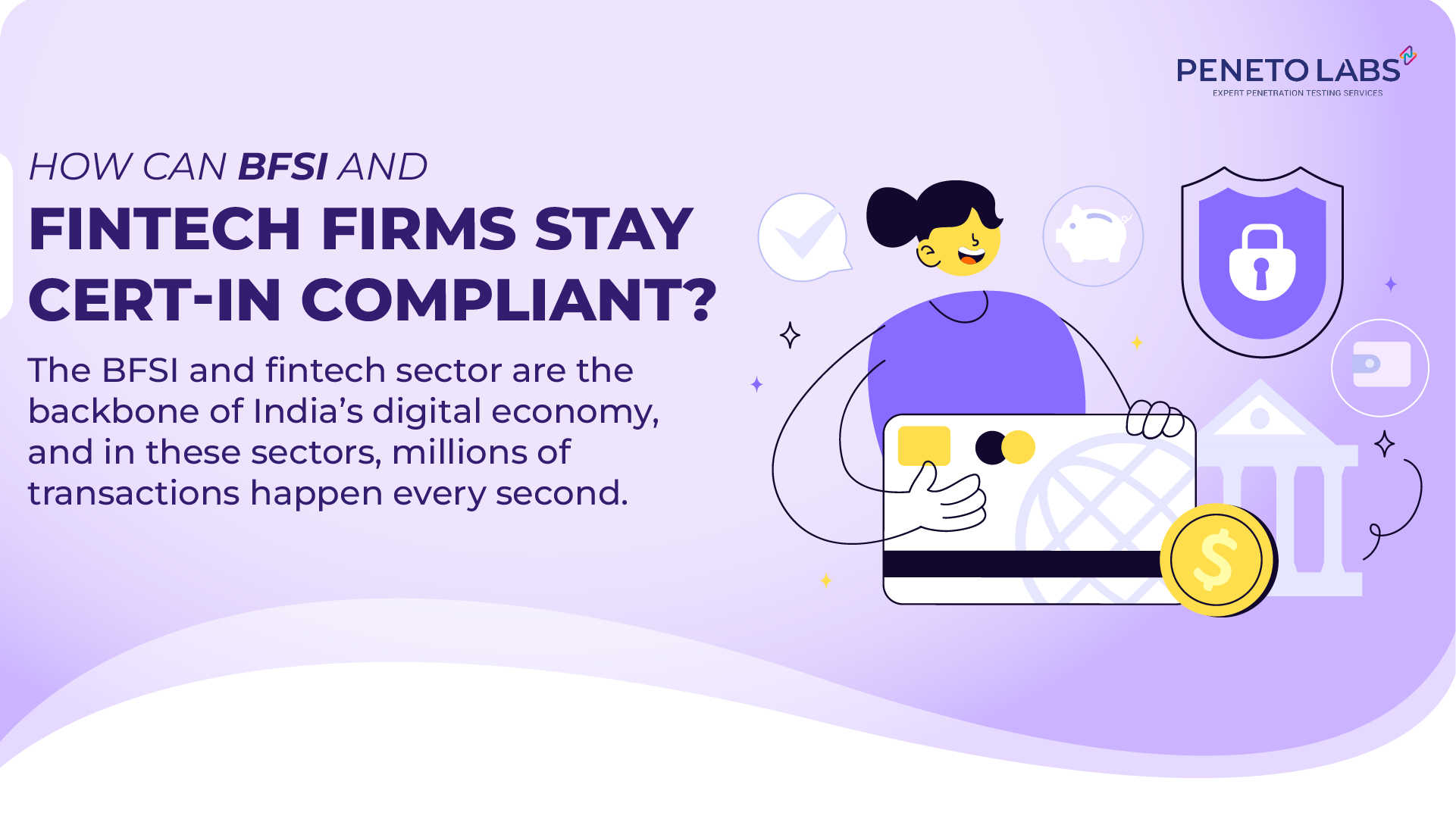The BFSI and fintech sector are the backbone of India’s digital economy, and in these sectors, millions of transactions happen every second. Even a small security gap in these organizations can cause huge financial and reputational damage.
That’s why a bank, NBFC, or fintech platform must remain CERT-In compliant. It not only avoids penalties but also builds customer trust and protects your business’s reputation.
Why is CERT-In Compliance important for BFSI and Fintech?
BFSI and fintech firms deal with highly sensitive customer data and payment records. Regulatory bodies such as the RBI and SEBI often recommend following CERT-In guidelines for audits, in addition to their own cybersecurity frameworks. Without compliance, firms may not only lose licenses or face heavy fines, but also, in the case of any breach, non- compliance may lead to fraud, lawsuits, and permanent loss of reputation.
Key CERT-In Compliance Requirements for BFSI and Fintech
Below we have listed some of the major ways through which BFSI and Fintech can remain CERT-In compliant.
1. Mandatory Cybersecurity Guidelines to Follow
- Section 70B(6) of the IT Act: This act designates the Indian Computer Emergency Response Team (CERT-In) as the national agency for cyber security incident response. It makes it mandatory for all organizations operating in India to adhere to CERT-In. Furthermore, Section 70B (7) makes non-compliance punishable by imprisonment and/or a fine.
- Digital Personal Data Protection Act (DPDP Act) 2023: All BSFI and Fintech organizations must ensure strict data privacy and protection of customer information as per this act.
- RBI Cybersecurity Framework for Banks: All companies under BSFI and Fintech must comply with RBI’s sector-specific security requirements to safeguard the financial infrastructure.
2. Timely Reporting of Cyber Incidents
- All cybersecurity incidents must be reported to CERT-In within 6 hours of detection.
- Delayed reporting can invite penalties and regulatory scrutiny.
3. Regular Vulnerability Assessment & Penetration Testing (VAPT)
- Conduct VAPT of applications, networks, APIs, and servers.
- Free retesting and Safe-to-Host reports help ensure fixes are validated.
4. Independent Third-Party Cybersecurity Audits
- External vendors must do unbiased security audits and assessments to verify the security posture of systems and controls within the organization.
- A fresh audit must be carried out at every major change like migration, new product launch, or system update.
5. Access Control and User Management
- Apply the principle of least privilege.
- Employees must have only the minimum access needed for their role.
- Enforce Multi-Factor Authentication (MFA) for remote access.
6. Log Management and Monitoring
- All system and application access must be logged and monitored.
- Logs should be retained for at least 180 days as per CERT-In guidelines.
7. Encryption and Secure Configuration
- Sensitive data like customer IDs, payment details, and financial records must be encrypted.
- Servers, APIs, and databases must be hardened against attacks.
- Use network segmentation to isolate sensitive systems and reduce breach impact.
8. Risk-Based Approach to Security
- CERT-In requires firms to align audits with business risks.
- This includes threat modelling, risk scoring, and prioritization of vulnerabilities.
How BFSI and Fintech Firms Can Prevent Breaches?
Here are some of the tips for BSFI and Fintech companies to avoid breaches and stay protected.
- Automate Compliance Tracking: Use tools that alert you for unpatched systems or missed updates.
- Train Teams Regularly: Conduct cybersecurity awareness programs for IT, risk, and compliance teams.
- Partner with Certified Vendors: Work with CERT-In empanelled auditors and other professional vendors for audits, VAPT, and compliance checks.
- Adopt Continuous Testing: Security testing should not be a one-time project. Schedule periodic checks.
- Integrate Security into Development: Adopt DevSecOps practices to find and fix vulnerabilities early.
About Peneto Labs, a Cybersecurity Firm Trusted By Top BFSI and fintech Firms
Peneto Labs is a cybersecurity company with deep expertise in BFSI and fintech security. Peneto Labs has been empanelled by CERT-In to conduct information security auditing services. Our certified team of experts offers comprehensive penetration testing, compliance-grade reporting and free retesting.
We work closely with IT, risk, and compliance teams to ensure smooth audits and stronger defenses. With a proven track record of securing banks, NBFCs, and digital lending platforms such as Axis Finance, Federal Bank, GEOJIT, Dhanalakshmi Bank, NCDEX, Peneto Labs is the trusted partner you need to stay compliant and resilient.
Final Thoughts
With cybercriminals constantly targeting financial data, BFSI and fintech firms that delay compliance risk losing both money and customer trust. Regular audits, timely reporting, and partnering with the right experts like Peneto Labs can make the difference between a secure system and a costly breach. Call us now and get a FREE quote today!
